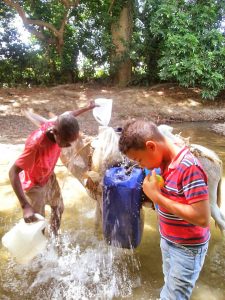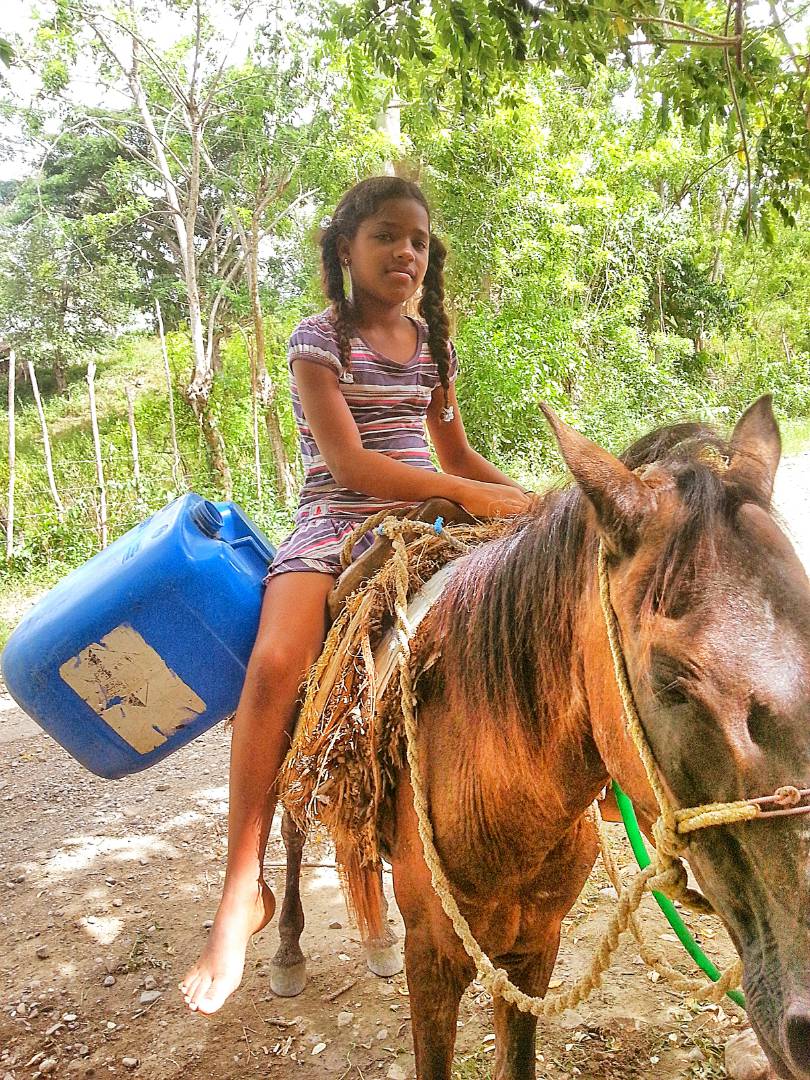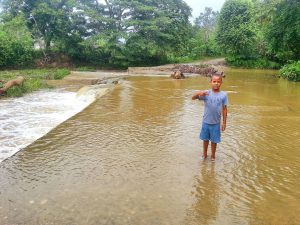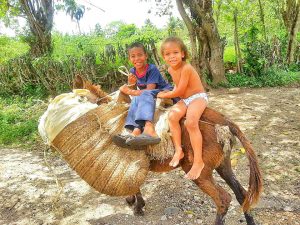This project is made possible through the partnership of WATER CHARITY and the National Peace Corps Association. ![]()
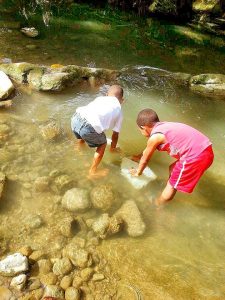 Location
Location
Ranchito de los Peralta, Region of Puerto Plata, Dominican Republic
Community Description
Ranchito de los Peralta is a low-income agricultural community in the region of Puerto Plata, Dominican Republic. All crops are cultivated for family consumption. There are approximately 450 people in the community, living in 70 homes.
The community is situated on the Caonao River, on a road of 13 kilometers. It is divided into an upper and lower, and spans approximately 3 kilometers. There are homes that sit on both sides of the river. About 80% of families still carry water from the river to use for household uses, including drinking, hygiene, sanitation, washing clothes, and gardening. Other families have private pump systems that bring water up through small pipes to their homes.
Problem Addressed
The community suffers from a lack of accessible, potable water. The main water source is the Guananico River, and it is unprotected and contaminated. The river serves approximately 3,000 in the surrounding areas. It is used for livestock, washing motorcycles, garbage dumping, bathing, and collecting water. During the rainy seasons, the river level rises into flood plains causing the water to be too dirty to be collected.
Families carry the water straight from the river or from a shallow river hole. Rainwater is collected from unclean rooftops and is dependent on rain. The families that can afford it buy bottled water, but are dependent on the water truck which frequently takes days to replenish the stock. There are nineteen families with water-filters, yet still must carry the water from the river.
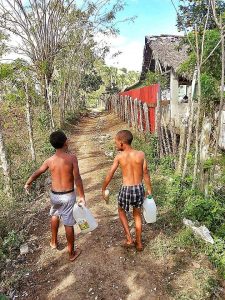 The river is a 5-15 minute walk from most homes. Mainly women and children are in charge of gathering water, by hand or on pack animals. Daily, 2-3 hours are spent collecting water for household needs.
The river is a 5-15 minute walk from most homes. Mainly women and children are in charge of gathering water, by hand or on pack animals. Daily, 2-3 hours are spent collecting water for household needs.
Since there is no local clinic, it is hard to know the health effects that are caused by a lack of clean water, but one can only assume that most cases of diarrhea (for instance) are caused by the poor quality of the local water.
Project Description
The project is to dig a well, install an electric pump, and build a storage tank on high ground. The water will be fed by gravity and distributed to the community through a system of piping.
The well will be constructed by a drilling company in Puerto Plata. The Ferro-cement storage tank, holding 12,000 gallons, will be 451 meters above the well and 34.9 meters above the community.
The electrical source is 25 meters from the well location. Piping will distribute the water throughout the community, a total distance of 3.74 km. Homes that are located on five side streets and homes that are located on the other side of a small river are also included. Everyone in the community will have direct home access to a gravity-fed water tap
The Peace Corps volunteer will support the Water Committee in the administration of their tasks, including collecting the monthly and subscription quota, clarifying/publicizing the work commitment of and to the community, and organizing and overseeing the work brigades.
UNFPA (United Nations Population Fund) will come to train the local women’s health promoter group, Hogares Saludables (Healthy Homes), who will educate the community on water hygiene, food sanitation, and water conservation.
The project is estimated to be completed 2 months after it is started
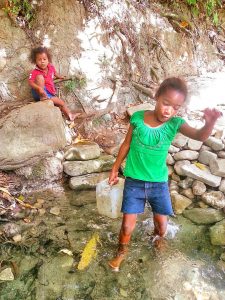 Project Impact
Project Impact
450 people will be directly served, and over 3,000 who use the river will benefit.
Peace Corps Volunteer Directing Project
Rivkah Cohen
Monitoring and Maintenance
The project will be organized and managed by the local Water Committee, the local health promoter group, Hogares Saludables, Peace Corps, and Caritas in Puerto Plata.
The Water Charity funds will accomplish the initial construction, including the well drilling, land preparation, construction of the tank, and water quality testing. Caritas will fund the engineer/technical labor, piping and distribution materials and installation, and electrical equipment.
The community will fund future repairs, transportation costs of the solicitation process, labor and meal costs.
Caritas will train a team of technicians from the community for system maintenance and repairs, continue to evaluate the project and assess community involvement, support, and satisfaction, and visit the community regularly.
Hogares Saludables is fully committed to the sustainability of the project. After Hogares Saludable’s initial capacitation of the community, the Peace Corps Volunteer will work with the group to create a work plan for future house visits and campaigns on water hygiene and water conservation. The group will be supported by local NGO Fundacion de Salud y Progreso del Norte (Health and Northern Advancement Foundation).
The Water Committee is also fully committed to sustainability. They will continue to meet bi-monthly, and collect the community monthly fee. The community fund will pay for future repairs.
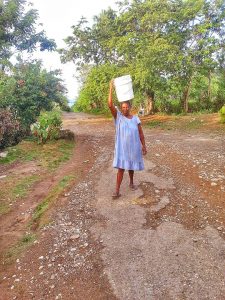
Dollar Amount of Project
$5,500
Donations Collected to Date
$50
Dollar Amount Needed
$5,450
ADOPT THIS PROJECT BY CONTRIBUTING THE DOLLAR AMOUNT OF THE PROJECT.
Donations of any amount will be appreciated. The full amount will allow you a posted dedication if that is something you would like.
